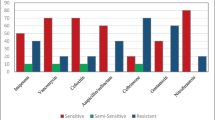Abstract
The aim of this study was to determine the distribution and antibiotic susceptibility patterns of bacterial strains isolated from adults with community-acquired urinary tract infections (UTI) in France. From December 1996 to March 1997, each of 15 private laboratories in France consecutively collected about 80 non-duplicate strains isolated from adult outpatients with UTI, including patients receiving care at home, and tested their susceptibility by the disk diffusion test. A total of 1160 strains were collected: 1031 gram-negative bacilli, including Escherichia coli (n=865), Proteus mirabilis (n=68) and Klebsiella spp. (n=40), and 129 gram-positive cocci, including Staphylococcus aureus (n=16), other staphylococci (n=25), group B streptococci (n=25) and enterococci (n=63). In the case of 430 bacterial isolates, the patients had either been hospitalised in the last 6 months or received antibiotic treatment in the last 3 months. The antibiotic susceptibility rates for Escherichia coli were: amoxicillin (58.7%), amoxicillin-clavulanic acid (63.3%), ticarcillin (61.4%), cephalothin (66.8%) cefuroxime (77.6%), cefixime (83.6%), cefotaxime (99.8%), ceftazidime (99%), nalidixic acid (91.9%), norfloxacin (96.6%), ofloxacin (96.3%), ciprofloxacin (98.3%), cotrimoxazole (78.2%), fosfomycin (99.1%) and gentamicin (98.4%). Of the Enterobacteriaceae, five strains produced an extended-spectrum beta-lactamase. Methicillin resistance was detected in nine Staphylococcus aureus isolates. The most important findings were two extended-spectrum, beta-lactamase-producing and three methicillin-resistant Staphylococcus aureus strains isolated from patients who had not been hospitalised in the last 6 months or taken antibiotics in the last 3 months. The findings indicate that these strains can spread within the community; therefore, monitoring antibiotic susceptibility of bacteria isolated in the community appears to be mandatory.
Similar content being viewed by others
Author information
Authors and Affiliations
Consortia
Rights and permissions
About this article
Cite this article
Goldstein, F., The Multicentre Study Group. Antibiotic Susceptibility of Bacterial Strains Isolated from Patients with Community-Acquired Urinary Tract Infections in France. EJCMID 19, 112–117 (2000). https://doi.org/10.1007/s100960050440
Issue Date:
DOI: https://doi.org/10.1007/s100960050440



